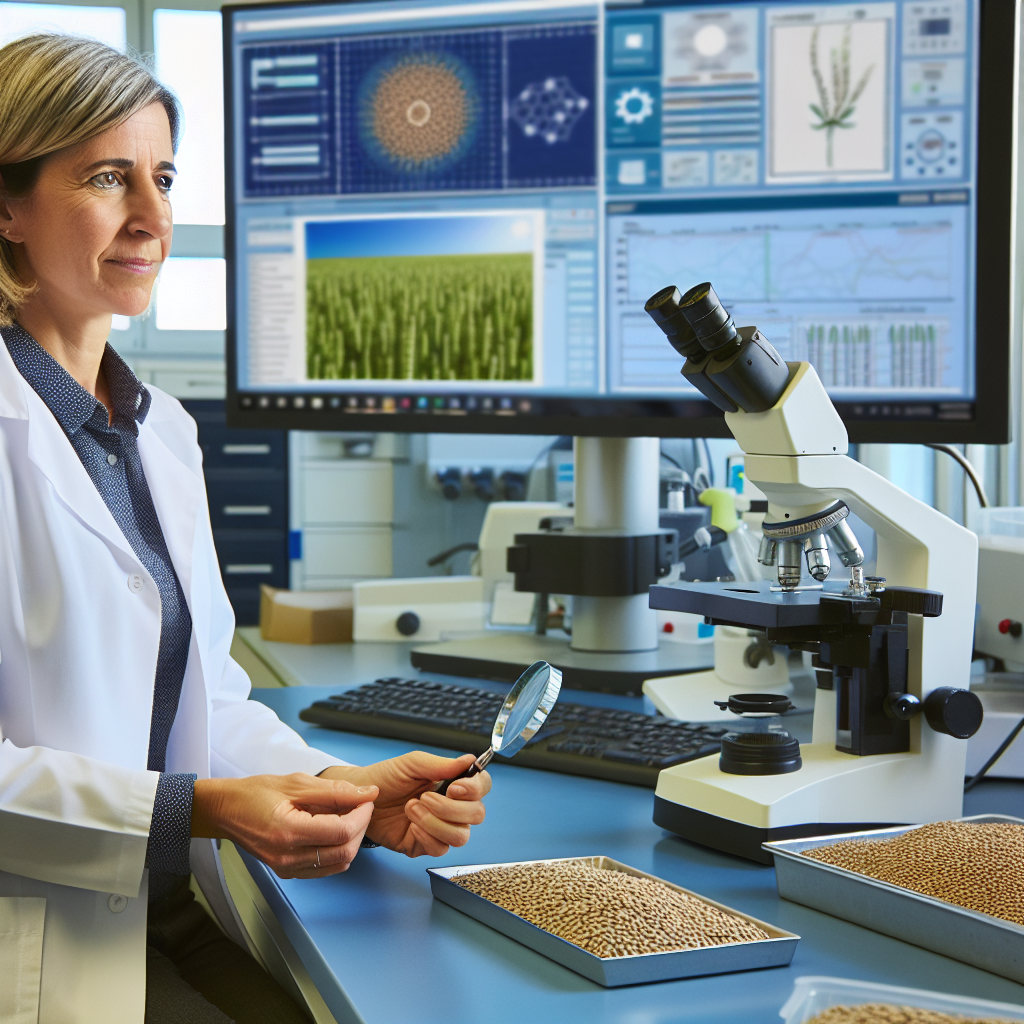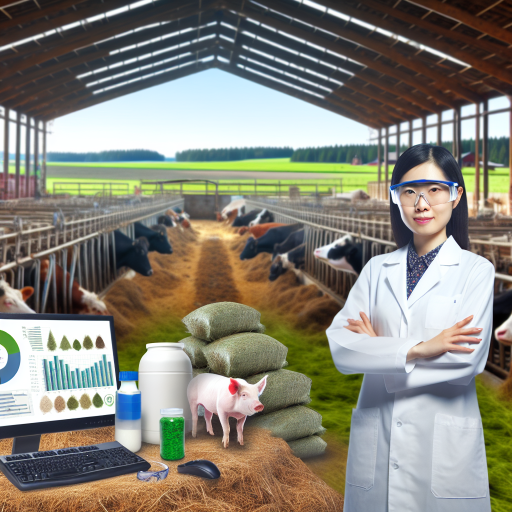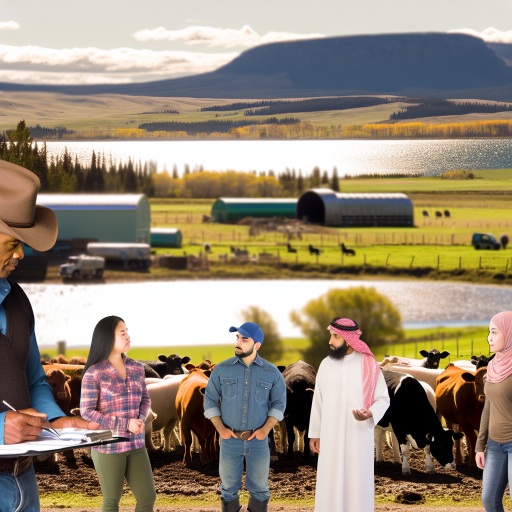Overview of Seed Genetics
Historical Perspective
Seed genetics has evolved significantly over the centuries.
Ancient civilizations practiced selective breeding of crops.
Farmers aimed to enhance yield and resilience.
In the 20th century, Mendel’s principles revolutionized breeding methods.
Genetic understanding improved through scientific advancements.
This led to the development of hybrid seeds.
Hybrid seeds provided higher yields and disease resistance.
Yet, challenges regarding genetic diversity arose.
Farmers relied heavily on a limited range of varieties.
Recent Innovations
Recent years have experienced groundbreaking innovations in seed genetics.
Biotechnology has emerged as a game-changer in agriculture.
Genetic modification allows for tailored traits in crops.
For instance, some seeds are engineered to withstand drought.
This is particularly beneficial in arid regions.
Moreover, gene-editing technologies like CRISPR are gaining traction.
These technologies enable precise changes in DNA sequences.
The result is improved disease resistance and enhanced nutrition.
Trends in Seed Technology
Several trends shape the future of seed technology.
Precision agriculture integrates data analysis into farming.
This approach maximizes efficiency and minimizes waste.
Sensors and drones collect real-time data on crops.
Additionally, sustainable practices are gaining importance.
Farmers focus on developing eco-friendly seed solutions.
This supports biodiversity and soil health.
Furthermore, digital platforms are creating new collaboration opportunities.
Unlock Your Career Potential
Visualize a clear path to success with our tailored Career Consulting service. Personalized insights in just 1-3 days.
Get StartedFarmers can share insights and access cutting-edge research.
The Role of Genomics in Seed Development
Introduction to Genomics in Agriculture
Genomics has transformed seed development significantly.
This technology enables precise manipulation of plant genetics.
It enhances the efficiency of breeding programs.
Moreover, it helps in understanding plant traits better.
Techniques Used in Seed Genomics
DNA sequencing is a cornerstone technique in genomics.
This method allows scientists to read genetic information accurately.
Marker-assisted selection follows DNA screening.
This technique selects desirable traits in plants quickly.
Furthermore, genome editing, such as CRISPR, offers new possibilities.
This technique targets specific genes with precision.
Benefits of Genomic Techniques
Genomics accelerates the development of improved seed varieties.
Such varieties often exhibit enhanced disease resistance.
Additionally, they can withstand environmental stresses better.
Ultimately, this leads to increased agricultural productivity.
Future Trends in Seed Genomics
Research is focusing on integrating big data in genomics.
This integration will provide deeper insights into crop genetics.
Collaborations between companies and universities will grow.
Such partnerships will enhance research capabilities and resources.
Moreover, advancements in computational biology will emerge.
Real-World Applications
Many seed companies are adopting genomic technologies.
For example, Pioneer Hi-Bred focuses on hybrid corn innovations.
Similarly, Bayer Crop Science develops resistant soybean varieties.
These applications showcase the technology’s impact on real-world farming.
CRISPR and Gene Editing: Transforming Seed Genetics
Introduction to CRISPR Technology
CRISPR technology revolutionizes the field of genetics.
Initially discovered in bacteria, CRISPR acts as a defense mechanism.
Researchers adapted this system for editing DNA in various organisms.
This process allows for precise changes to an organism’s genetic makeup.
Benefits of Gene Editing in Seed Development
Gene editing enhances crop traits effectively and efficiently.
It enables the development of disease-resistant plants.
Additionally, plants can now withstand extreme environmental conditions.
This technology increases yield potential and nutritional quality.
Importantly, CRISPR reduces the time needed to develop new crop varieties.
Current Applications in Agriculture
Farmers increasingly rely on CRISPR-modified seeds.
For instance, drought-resistant varieties have been introduced.
These plants require less water, significantly benefiting farmers.
Furthermore, researchers have developed crops with enhanced nutrient profiles.
Such crops can help address global hunger and malnutrition issues.
Regulatory Challenges and Considerations
The regulatory landscape for gene-edited seeds varies globally.
Some countries embrace CRISPR technology, while others impose restrictions.
Regulatory clarity is crucial for widespread acceptance of gene editing.
Stakeholders must navigate ethical and safety concerns effectively.
Moreover, public perception plays a vital role in acceptance.
Future Trends in Seed Genetics
The future of seed genetics looks promising with ongoing advancements.
Innovations in gene editing techniques continue to emerge.
Furthermore, integrating AI and genomics enhances research efficiency.
These advancements will likely lead to more resilient and productive crops.
Ultimately, CRISPR and gene editing have the potential to transform agriculture.
Find Out More: Arborists and the Preservation of Historic Trees and Forests
Biotechnology Advancements
Introduction to Biotechnology in Agriculture
Biotechnology has transformed modern agriculture significantly.
This technology enhances crop yields and improves quality.
Moreover, it addresses global food security challenges effectively.
Genetic Modification Techniques
Genetic modification involves altering plant DNA for desired traits.
For example, scientists use CRISPR technology to edit genes precisely.
This technique allows for rapid development of resilient crops.
As a result, farmers can grow crops better suited to their climate.
Benefits of Genetic Modification
- Increased resistance to pests and diseases promotes sustainable farming.
- Enhanced tolerance to environmental stresses allows for farming in harsher conditions.
- Improved nutritional content provides better food options for consumers.
Biotechnology and Crop Yield
Biotechnology significantly impacts crop yield improvement.
Crops engineered for higher productivity sustain larger populations.
Furthermore, advancements reduce the need for chemical inputs.
This reduces environmental pollution and enhances sustainability.
Case Studies of Successful Biotechnology
- Bt cotton has shown increased yields through pest resistance.
- Drought-resistant maize varieties have thrived in arid regions.
- Golden Rice offers enhanced vitamin A, addressing malnutrition.
Future Trends in Biotechnology
The future of biotechnology in agriculture looks promising.
Innovative breeding techniques will likely emerge and evolve.
Artificial intelligence and machine learning will enhance research efficiency.
Additionally, gene editing will become more accessible for farmers.
Emerging Technologies
- Gene drives offer potential for targeted pest control.
- Bioreactors for producing plant-based bioproducts attract investment.
- Blockchain enhances transparency in food supply chains.
Implications of Biotechnology Advancements
Biotechnology advancements revolutionize agriculture positively.
They promise to continue improving crop yield and quality.
Furthermore, they play a critical role in global food security.
Explore Further: Key Responsibilities of a Crop Advisor in Canada
Sustainability in Seed Technology
Environmental Considerations
Sustainable seed technology focuses on conserving natural resources.
This approach minimizes the ecological footprint of agriculture.
Innovations in seed genetics improve yield while reducing inputs.
Moreover, genetic modifications can enhance disease resistance.
These advancements lead to more resilient crops.
Consequently, they require fewer pesticides and fertilizers.
Additionally, sustainable practices can support biodiversity.
This aspect protects various species within ecosystems.
Economic Considerations
Economic sustainability is crucial for seed technologies.
Economically sustainable seed technologies can increase profitability for farmers.
Higher crop yields translate into better financial outcomes.
Moreover, reduced dependency on chemical inputs lowers production costs.
Farmers who invest in sustainable seeds often see quicker returns.
This investment leads to long-term economic stability.
Furthermore, these advancements can open up new markets.
For instance, organic farmers benefit from superior seed genetics.
They attract consumers willing to pay a premium for quality products.
Collaborations and Partnerships
Collaboration among stakeholders enhances sustainable practices in seed technology.
Public research institutions often partner with private companies.
This collaboration accelerates innovation and development.
Moreover, governmental support can bolster these efforts.
Investment in research yields valuable knowledge and tools.
Farmers, scientists, and policymakers can work together effectively.
The combined efforts promote sustainable agriculture practices.
Future Trends in Seed Technology
Future trends indicate a shift towards more sustainable solutions.
Biotech advancements will continue to play a vital role.
Emerging technologies can provide higher efficiency in crop production.
Furthermore, data-driven agriculture will enhance decision-making.
Farmers can leverage analytics to optimize their operations.
As a result, this will support both economic and environmental goals.
Discover More: Importance Of Livestock Nutrition In Canada

The Global Impact of Seed Genetic Advancements on Food Security
Enhancing Crop Resilience
Advancements in seed genetics significantly enhance crop resilience.
Farmers can now cultivate crops that withstand harsh climates.
This resilience helps to secure food supplies during unpredictable weather.
Additionally, genetically modified seeds reduce crop failure risks.
Ultimately, these improvements contribute to a stable food supply globally.
Boosting Yield Potential
Seed genetic advancements increase the yield potential of crops.
Farmers can produce more food using the same amount of land.
This increase plays a crucial role in feeding growing populations.
Furthermore, advanced genetics allow for optimized nutrient uptake.
Higher nutrient efficiency leads to better food quality as well.
Reducing Environmental Impact
Modern seed technologies significantly reduce environmental footprints.
Genetic advancements lead to crops requiring fewer chemical inputs.
For instance, pest-resistant varieties decrease pesticide use.
Similarly, drought-tolerant seeds help conserve water resources.
These benefits contribute to more sustainable agricultural practices.
Supporting Economic Stability
Seed genetic innovations can boost local economies around the world.
Farmers experience increased profits from higher yields.
In turn, this economic stability fosters rural development.
Moreover, access to advanced seed technology creates job opportunities.
Stronger agricultural sectors lead to better food security overall.
Addressing Nutritional Needs
Seed genetics also play a role in improving nutritional quality.
Biofortified crops provide essential vitamins and minerals.
This advancement addresses malnutrition in vulnerable populations.
Ultimately, improved nutrition translates to healthier communities.
Stronger public health outcomes support long-term food security efforts.
Uncover the Details: Education and Certifications for Seed Technologists
Emerging Technologies: AI and Big Data in Seed Research and Development
Integration of AI in Seed Genetics
Artificial Intelligence (AI) revolutionizes seed genetics significantly.
With machine learning, scientists optimize breeding processes effectively.
AI analyzes vast datasets to identify desirable traits quickly.
Additionally, predictive analytics helps forecast plant responses to environmental changes.
Role of Big Data in Seed Development
Big data transforms seed development methodologies comprehensively.
Researchers gather extensive field data to refine seed lines efficiently.
This data-driven approach enhances precision in crop breeding.
Consequently, crop yields improve alongside environmental resilience.
Collaborative Research and Innovation
Collaboration across various sectors fosters innovation in seed technology.
Universities, corporations, and startups join forces to push boundaries.
Partnerships enhance access to advanced technologies and expertise.
This synergy accelerates the development of robust seed varieties.
Ethical Considerations and Regulation
As technology advances, ethical considerations emerge in seed research.
Stakeholders must address concerns about genetic manipulation transparently.
Regulatory frameworks need to adapt to fast-paced innovations consistently.
Ethical guidelines ensure public trust in new seed technologies.
Future Prospects in Seed Research
The future of seed research looks promising with ongoing advancements.
Continued integration of AI and big data will further enhance seed quality.
Additionally, emerging technologies will address global food security effectively.
Ultimately, innovative practices will shape sustainable agriculture for future generations.
Future Trends in Seed Genetics
Emerging Technologies
Advanced techniques will reshape seed genetics in the coming years.
CRISPR gene editing stands out as a pivotal innovation.
This technology allows precise modifications to plant genomes.
Additionally, synthetic biology will enable novel traits in crops.
These advancements will support resilience against pests and diseases.
Moreover, biotechnology integration will facilitate improved crop yield.
Increased Use of AI and Data Analytics
Artificial intelligence will play a crucial role in seed genetics.
Data analytics will enhance breeding strategies significantly.
Breeders will utilize large datasets to identify desirable traits.
This approach will streamline the selection process effectively.
Consequently, it will reduce the time required to develop new varieties.
Focus on Sustainability
Sustainability will guide future seed genetic advancements.
Researchers will focus on developing drought-resistant varieties.
These crops will conserve water while maintaining productivity.
Additionally, efforts will target improved soil health through genetics.
Global Collaborations
International partnerships will drive seed genetics research.
Collaboration will foster knowledge sharing and resource pooling.
Organizations will work together to tackle global food security challenges.
Such initiatives will promote adaptive genetic strategies for diverse environments.
Regulatory Changes
Future regulations will adjust to emerging technologies in genetics.
Governments will likely reassess approval processes for genetically modified seeds.
With evolving consumer perceptions, transparency will be crucial.
As a result, education on genetic innovations will become essential.
Additional Resources
Application of digital technologies for ensuring agricultural productivity




